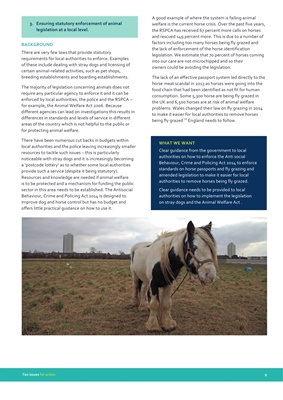
9
Ten issues for action
3. Ensuring statutory enforcement of animal
legislation at a local level.
BACKGROUND
There are very few laws that provide statutory
requirements for local authorities to enforce. Examples
of these include dealing with stray dogs and licensing of
certain animal-related activities, such as pet shops,
breeding establishments and boarding establishments.
The majority of legislation concerning animals does not
require any particular agency to enforce it and it can be
enforced by local authorities, the police and the RSPCA -
for example, the Animal Welfare Act 2006. Because
different agencies can lead on investigations this results in
differences in standards and levels of service in different
areas of the country which is not helpful to the public or
for protecting animal welfare.
There have been numerous cut backs in budgets within
local authorities and the police leaving increasingly smaller
resources to tackle such issues - this is particularly
noticeable with stray dogs and it is increasingly becoming
a 'postcode lottery' as to whether some local authorities
provide such a service (despite it being statutory).
Resources and knowledge are needed if animal welfare
is to be protected and a mechanism for funding the public
sector in this area needs to be established. The Antisocial
Behaviour, Crime and Policing Act 2014 is designed to
improve dog and horse control but has no budget and
offers little practical guidance on how to use it.
WHAT WE WANT
Clear guidance from the government to local
authorities on how to enforce the Anti social
Behaviour, Crime and Policing Act 2014 to enforce
standards on horse passports and fly grazing and
amended legislation to make it easier for local
authorities to remove horses being fly grazed.
Clear guidance needs to be provided to local
authorities on how to implement the legislation
on stray dogs and the Animal Welfare Act .
A good example of where the system is failing animal
welfare is the current horse crisis. Over the past five years,
the RSPCA has received 67 percent more calls on horses
and rescued 149 percent more. This is due to a number of
factors including too many horses being fly grazed and
the lack of enforcement of the horse identification
legislation. We estimate that 70 percent of horses coming
into our care are not microchipped and so their
owners could be avoiding the legislation.
The lack of an effective passport system led directly to the
horse meat scandal in 2013 as horses were going into the
food chain that had been identified as not fit for human
consumption. Some 5,300 horse are being fly grazed in
the UK and 6,500 horses are at risk of animal welfare
problems. Wales changed their law on fly grazing in 2014
to make it easier for local authorities to remove horses
being fly grazed 11 England needs to follow.